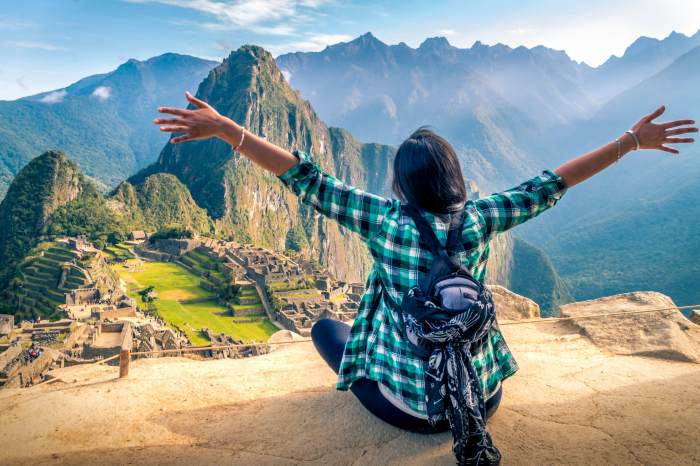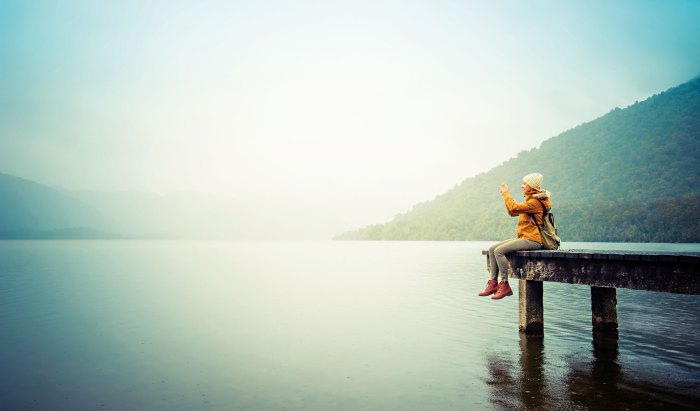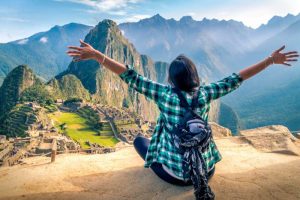
Embark on a journey to discover the essence of solo travel with ‘What is Solo Travel?’ at the forefront. Delve into the world of independent exploration and uncover the hidden gems of traveling alone.
Solo travel opens up a realm of possibilities, from cultural immersion to culinary delights, promising a unique experience tailored to the adventurous soul.
What is Solo Travel?

Solo travel refers to the act of exploring new destinations and embarking on adventures alone, without the company of friends or family. It is a unique way to experience the world and offers a sense of independence and freedom that is unmatched. Solo travel has gained popularity in recent years, with more people choosing to venture out on their own to discover new cultures, meet new people, and challenge themselves in unfamiliar environments.
Significance of Solo Travel
Solo travel allows individuals to step out of their comfort zone and push their boundaries. It offers a chance for self-discovery, personal growth, and a deeper understanding of oneself. By navigating through unfamiliar territories alone, solo travelers learn to rely on their own instincts and problem-solving skills, leading to increased confidence and self-reliance.
- Empowerment: Solo travel empowers individuals to make decisions for themselves and take control of their own experiences.
- Flexibility: Traveling alone gives the freedom to set your own itinerary and make spontaneous decisions without having to compromise with others.
- Cultural immersion: Solo travelers have the opportunity to immerse themselves in local cultures, interact with locals, and gain a deeper appreciation for diverse customs and traditions.
Traveling solo allows individuals to break free from their routine and experience a sense of liberation that comes with exploring the unknown.
Benefits of Solo Travel
Solo travel offers a myriad of benefits that contribute to personal growth and enriching experiences. It provides an opportunity for self-reflection, introspection, and a chance to disconnect from the hustle and bustle of daily life. Additionally, solo travel allows individuals to tailor their experiences to their preferences and interests, creating a truly unique and fulfilling journey.
- Personal growth: Solo travel challenges individuals to step out of their comfort zone, overcome fears, and develop new skills.
- Independence: Traveling alone fosters independence and self-sufficiency, as individuals learn to navigate through unfamiliar environments on their own.
- Self-discovery: Solo travel offers a chance for introspection and self-discovery, allowing individuals to gain a deeper understanding of themselves and their capabilities.
Challenges of Solo Travel
While solo travel can be incredibly rewarding, it also comes with its set of challenges and obstacles that travelers may encounter along the way. These challenges can range from feelings of loneliness and isolation to safety concerns and logistical issues. It is important for solo travelers to be prepared for these challenges and take necessary precautions to ensure a safe and enjoyable journey.
- Loneliness: Traveling alone can sometimes lead to feelings of loneliness, especially during quiet evenings or long journeys.
- Safety concerns: Solo travelers may face safety concerns, such as navigating through unfamiliar neighborhoods or dealing with unforeseen emergencies.
- Logistical challenges: Planning a solo trip requires meticulous planning and organization to ensure a smooth and hassle-free experience.
Cultural Tourism
Cultural tourism involves traveling to experience the culture, heritage, arts, and lifestyle of a destination. It allows travelers to immerse themselves in the local traditions, customs, and history, gaining a deeper understanding of the place they are visiting.
Importance of Cultural Tourism
- Preservation of heritage and traditions
- Promotion of cross-cultural understanding and tolerance
- Economic benefits for local communities through tourism
Popular Cultural Tourism Destinations
- Paris, France – known for its art, fashion, and cuisine
- Jaipur, India – famous for its vibrant culture and historical landmarks
- Cusco, Peru – rich in Incan heritage and archaeological sites
Engaging with Local Cultures as a Solo Traveler
- Participate in cultural events and festivals
- Visit local markets and interact with vendors
- Take a cooking class to learn about traditional cuisine
- Stay in homestays or guesthouses to connect with locals
Eco-Tourism
Eco-tourism focuses on responsible travel to natural areas that conserves the environment, sustains the well-being of the local people, and involves interpretation and education. It promotes sustainability, minimizes the impact on the environment, and respects local cultures.
Impact of Eco-Tourism on the Environment
- Eco-tourism helps to preserve natural habitats and wildlife by supporting conservation efforts and raising awareness about environmental issues.
- It promotes the use of renewable energy sources, reduces waste, and supports eco-friendly practices to minimize pollution and carbon footprint.
- By engaging with local communities and supporting their livelihoods, eco-tourism helps to protect cultural heritage and traditional knowledge.
How Solo Travelers Can Contribute to Eco-Friendly Travel Practices
- Choose eco-friendly accommodations that prioritize sustainability and support local communities.
- Minimize waste by carrying reusable items such as water bottles, bags, and utensils, and avoid single-use plastics.
- Respect wildlife and natural habitats by observing animals from a safe distance and following designated trails to avoid damaging sensitive ecosystems.
- Support local conservation projects and initiatives by volunteering or donating to organizations that work towards environmental protection.
- Offset your carbon footprint by choosing transportation options with lower emissions or by participating in carbon offset programs.
Culinary Travel
Culinary travel is a form of tourism where the main focus is on the food and beverages of a particular region. It involves exploring local cuisines, traditional dishes, street food, and fine dining experiences. For many travelers, food is a way to connect with the culture and history of a destination, making it a significant aspect of their journey.
Exploring Local Cuisines as a Solo Traveler
- Research local dishes and specialties before your trip to have an idea of what to try.
- Visit markets, food stalls, and local restaurants to taste authentic flavors and interact with locals.
- Take cooking classes to learn how to prepare traditional dishes and bring a piece of the culture back home.
- Be open to trying new foods and flavors, even if they may seem unfamiliar at first.
The Role of Food in Experiencing Different Cultures
Food plays a crucial role in experiencing different cultures while traveling solo. It provides insight into the history, traditions, and values of a community. By sharing meals with locals, solo travelers can establish connections, learn about local customs, and gain a deeper understanding of the destination. Each bite is a chance to explore a new world and create lasting memories.
Historical Travel
Historical travel involves exploring destinations that hold significant historical importance, allowing travelers to learn about the past and immerse themselves in the culture and heritage of a place.
Significance of Historical Travel
Historical travel provides a unique opportunity for solo travelers to gain insights into the rich history of a destination, understand its traditions, and appreciate the cultural influences that have shaped the society over time.
Famous Historical Travel Destinations
- The Acropolis in Athens, Greece – A symbol of ancient Greek civilization and home to iconic structures like the Parthenon.
- Machu Picchu in Peru – An ancient Incan city perched high in the Andes mountains, offering a glimpse into the architectural marvels of the past.
- The Colosseum in Rome, Italy – A grand amphitheater where gladiatorial contests and other spectacles took place during the Roman Empire.
Immersing in History as a Solo Traveler
Solo travelers can immerse themselves in the history of a place by visiting historical sites, museums, and monuments, taking guided tours, and interacting with locals to learn about the historical significance of different landmarks. Engaging in cultural activities, attending historical reenactments, and exploring ancient ruins are also great ways for solo travelers to deepen their understanding of a destination’s past.
Luxury Travel
When it comes to luxury travel, it involves indulging in high-end accommodations, exclusive experiences, personalized services, and lavish amenities that provide a heightened level of comfort and sophistication during your journey.
Benefits of Luxury Travel for Solo Travelers
- Access to top-notch accommodations: Solo travelers can enjoy luxurious stays in upscale hotels, resorts, or boutique properties that offer privacy, comfort, and exceptional service.
- Exclusive experiences: Luxury travel allows solo travelers to partake in unique and VIP experiences such as private tours, access to exclusive events, and customized itineraries tailored to their preferences.
- Pampering and relaxation: Solo travelers can indulge in spa treatments, gourmet dining, and other lavish amenities that promote relaxation, rejuvenation, and well-being during their trip.
- Safety and security: Luxury travel often includes added security measures, ensuring solo travelers feel safe and protected throughout their journey.
Enjoying Luxury Experiences within Budget
While luxury travel may seem expensive, there are ways for solo travelers to enjoy upscale experiences without breaking the bank:
- Off-peak travel: Opting for travel during shoulder seasons or off-peak times can result in lower rates for luxury accommodations and experiences.
- Booking packages and deals: Taking advantage of promotions, discounts, and package deals offered by luxury travel providers can help solo travelers save on overall costs.
- Utilizing rewards programs: Enrolling in loyalty programs, using travel credit cards, and redeeming points can provide solo travelers with opportunities to access luxury perks and upgrades at a discounted rate.
- Exploring alternative accommodations: Consider staying in luxury hostels, boutique hotels, or vacation rentals to experience a touch of luxury at a more affordable price point.
Budget Travel
Budget travel refers to the practice of planning and executing a trip while being mindful of expenses, focusing on cost-effective options to make the most out of the travel experience without breaking the bank. This is particularly important for solo travelers who may not have the cost-sharing benefits of traveling in a group.
Tips for Budget Travelers
- Research and plan ahead to find affordable accommodation options such as hostels, guesthouses, or budget hotels.
- Opt for local transportation or walking instead of expensive taxis or private tours to save money on getting around.
- Take advantage of free or low-cost activities such as visiting parks, museums with discounted days, or attending local events.
- Prepare your own meals or eat at local markets and street food stalls to experience the local cuisine without splurging on restaurants.
- Look for deals and discounts on attractions, tours, and transportation to stretch your budget further.
Enhancing Solo Travel Experience with Budget Travel
Embracing budget travel as a solo traveler can lead to a more authentic and immersive experience. By interacting with locals, staying in budget accommodations, and exploring off-the-beaten-path destinations, solo travelers can gain a deeper understanding of the culture and lifestyle of the places they visit. Additionally, the resourcefulness and independence required for budget travel can contribute to personal growth and confidence, making the solo travel experience even more rewarding.
Backpacking
Solo backpacking is a form of travel where individuals explore different destinations while carrying all their belongings in a backpack. It offers a sense of freedom and flexibility, allowing travelers to immerse themselves in new cultures, meet people from all walks of life, and truly experience the destinations they visit.
Essentials for Solo Backpacking Trips
- Lightweight and durable backpack
- Compact sleeping bag and tent
- Portable stove and cookware
- Multi-purpose tools like a Swiss Army knife
- First aid kit and necessary medications
- Appropriate clothing for different weather conditions
- Reusable water bottle and water purification tablets
Freedom and Challenges of Backpacking Alone
- Freedom: Solo backpacking allows travelers to set their own pace, make spontaneous decisions, and truly immerse themselves in the destinations they visit.
- Challenges: Traveling alone can be daunting at times, especially when faced with language barriers, navigation issues, or unexpected situations. It requires self-reliance, adaptability, and problem-solving skills.
- Connection: Backpacking alone often leads to meaningful connections with locals and other travelers, fostering a sense of community and shared experiences.
- Personal Growth: Overcoming challenges while backpacking solo can lead to personal growth, increased confidence, and a deeper understanding of oneself.
Group Travel

When it comes to exploring the world, group travel offers a unique experience that differs from solo adventures. Traveling in a group involves journeying with a set of companions, whether friends, family, or even strangers, creating a shared experience that can enhance the overall trip.
Benefits of Group Travel
- Shared experiences and memories with companions.
- Opportunity to socialize and make new friends.
- Safety and security in numbers, especially in unfamiliar destinations.
- Access to group discounts and deals on accommodations, tours, and activities.
- Less planning and logistics management as tasks can be distributed among group members.
Comparison with Solo Travel
Traveling in a group offers a different dynamic compared to solo travel. While solo travel provides independence and flexibility, group travel focuses on shared experiences and camaraderie. Solo travelers have full control over their itinerary and decisions, while group travelers must compromise and consider the preferences of others.
Advantages and Disadvantages
- Advantages: Group travel can be more cost-effective, provide a sense of security, and foster new friendships.
- Disadvantages: Lack of independence, differing interests among group members, and potential conflicts or disagreements during the trip.
Conclusion
As we conclude this exploration of solo travel, remember that the path less traveled often leads to the most profound discoveries. Embrace the freedom, challenges, and endless opportunities that solo travel offers, and let your next adventure be a testament to the spirit of exploration.
Clarifying Questions
Is solo travel safe?
Solo travel can be safe with proper planning, research, and awareness of your surroundings. It’s essential to stay vigilant and take necessary precautions.
How can I meet people while traveling solo?
You can meet fellow travelers or locals by staying in hostels, joining group tours, attending social events, or using social media platforms designed for travelers.
What if I feel lonely while traveling solo?
Feeling lonely is normal at times during solo travel. Engage in activities you enjoy, reach out to other travelers, or connect with locals to combat loneliness.





